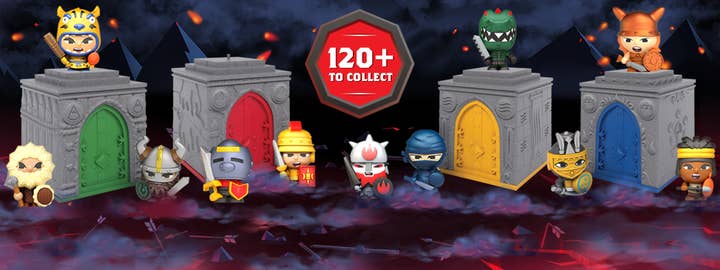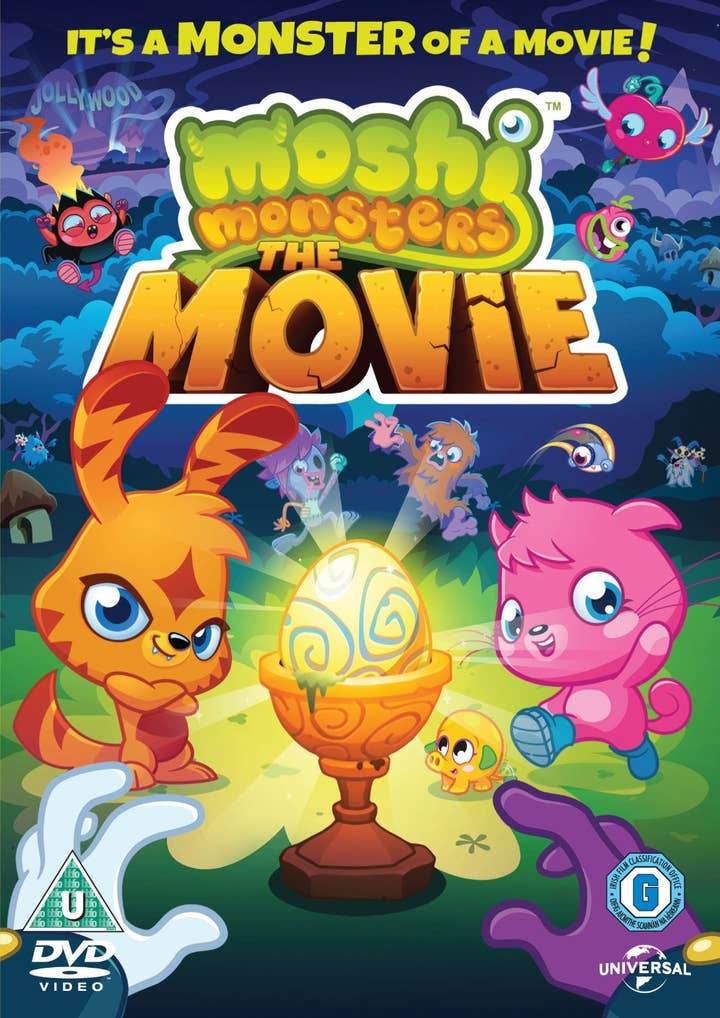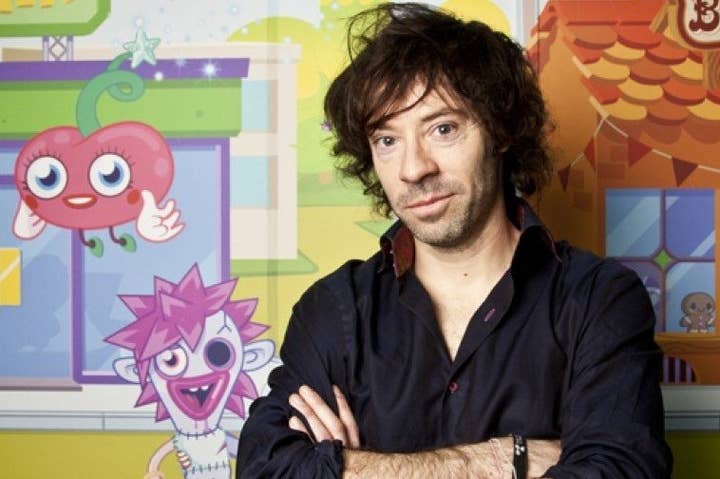Michael Acton-Smith and the future of Mind Candy
The founder and ex-CEO on why the bottom dropped out of the kids market
The announcement yesterday that Mind Candy was shuttering its Brighton studio Candy Labs was a harsh and poignant counterpoint to the headlines of the company's early successes. Not so long ago, the name was synonymous with tremendous growth and segment domination, trailblazing new realms of transmedia and licensing. Mind Candy was in a seemingly unassailable position, commanding massive revenues and tremendous market penetration. But there was always the spectre of the difficult second album: hatching the golden egg which Moshi Monsters had laid into another successful property.
The talented team at Candy Labs was at the very centre of the effort to solve that problem, developing major new IP World of Warriors along similar lines: a child friendly property with obvious licensing opportunities and clear potential for expansion into other media. So why, when the Brighton team did such a fine job of realising that IP, has the office been closed? Why is Mind Candy a fraction of its former size, both in terms of revenue and headcount? What changed between the market which bore such triumph for Moshi and that which swallowed Warriors whole? With rumours swirling about the fate of the firm after yesterday's news, GamesIndustry.biz spoke to founder and former CEO Michael Acton-Smith for a clearer picture of what the next few months will hold.
Inevitably, the news of Candy Labs' closure yesterday has, for some, called into doubt the future of Mind Candy as a viable concern. Are you able to give us an idea of exactly how deeply the cuts will run and what they mean for Mind Candy's future?
"We had such extraordinary success with Moshi Monsters, but with the switch from web-business to mobile, the commercial engine which drove the business was just no longer there."
Michael Acton-Smith: "I don't think it's any secret that Mind Candy has been having a difficult few years. We had such extraordinary success with Moshi Monsters, but with the switch from web-business to mobile, the commercial engine which drove the business was just no longer there. The amazing revenues which we had have just declined dramatically and we, and a lot of other kids' web properties, haven't been able to build successful businesses on mobile for a whole host of reasons, which I think the industry is pretty aware of. So that's been a massive challenge, managing Moshi coming down. We're planning on relaunching it for 2017, so spending time thinking about how that will work has been a big focus.
"But our big big bet was Warriors. We've been working on it for a couple of years, spending millions and millions of pounds. It's a beautiful game, fantastic product, amazing art. But the problem is that the results have been...OK, but not to the level which we were hoping or forecasting on the licensing or digital side of things. So, like any sensible company, when faced with that we've had to reduce the size of the business.
"I can't go into that too much as we're in the consulting period where we're trying to find out exactly where the redundancies are likely and how many people we'll be take down to, but it is happening.
"We're putting a lot of energy into a new brand that we're building at the moment, that will be an on and offline entertainment property that we'll be launching next year, we'll just be doing it with a smaller team. So challenging times at Mind Candy. I really feel for the people we have to let go, it's obviously a horrible, horrible thing to do, but we're trying to manage it in a respectful and professional way."

World of Warriors obviously didn't meet expectations, then. The last public numbers we heard seemed positive, though: 5.5 million downloads and six million dollars in revenues. Can you tell us exactly what the expectations were and just how short the reality fell?
Michael Acton-Smith: "Only that we had invested millions in it and that the Brighton team were extremely talented and did an incredible job. But we all know how extraordinarily competitive the mobile market is. I think we did well with it, the results have been good, but for the size of the company and the investment we put into it, the forecasts were bigger. Which is why we're faced with this challenging situation of working out how to continue supporting the game and the brand with a smaller cost base, which is something we absolutely want to do. That's what we're grappling with."
What were the key changes that made that transition from web-based to mobile business so hard, even with your accumulated warchest and market share? Was it a changing audience? The method of consumption? Payment models?
"The competition is immense. Kids just don't want to play those games specifically designed just for them"
Michael Acton-Smith: "How long have we got? That could be an entire book.
"We had a perfect storm with Moshi in the web era. We had half our revenues coming from subscriptions digitally, and half from our licensed products, and the two fed off each other very well. There were very big barriers to entry for building a virtual world for kids during the web era - highly specialised and quite difficult to do, so there were only a few major players who had got to scale: ourselves and Club Penguin and a few others.
"We, and many others, assumed that it would be relatively simple to transfer our business from the web to mobile, but the learning has been that, in the mobile eco-system, there are now millions of apps that they can choose from. They're less interested in playing traditional kids games when they have access to everything from Clash of Clans to Game of War to Candy Crush Saga. Games that aren't designed for them but have marketing budgets of hundreds of millions of dollars which means they see them every day, in pop culture and elsewhere.

"The competition is immense. Kids just don't want to play those games specifically designed just for them.
"The second thing is that when you are making games for kids, you can't go too deep into the in-app purchase model, which is where pretty much 95 per cent plus of the revenue on mobile is generated. Without that you cannot make the returns to invest on the marketing of the game. There are many restrictions on marketing to kids, and rightly so. We think that's important and we take that responsibility very seriously, but that means we can't do the same sort of marketing that those grown up games can do.
"There are also those big fixed costs behind the scenes, keeping your audience safe in your community etc, which are extremely important, but mean that in aggregation the economics are extremely difficult. It's why we haven't seen any recent big successes in the kids space. At the younger end of the market things like Toca Boca do well for pre-school audiences, but for the 6-12 year old audience, I can't think of any examples. The ones that have resonated with kids were originally designed for grown-ups - Just think of Minecraft.
"So that's a very short way of saying how tough it's been. We still think Moshi is a wonderful IP, great stories and emotions. We're just working out the best way to relaunch that, which will most likely be with animation in 2017."
"we're not going to build products which are just aimed at a kids audience any more. It's just too challenging"
So what are the key strategic changes going forward? How do you adapt?
Michael Acton-Smith: "We've learned a huge amount over the last year. One of the main things is that we're not going to build products which are just aimed at a kids audience any more. It's just too challenging. As much as we love creating for kids, I think the smartest way is to make more family friendly content that everyone can enjoy, like Pixar or Nintendo. I think that's stage one. Number two is that there are no silver bullets, there's no single way to do it. It's extremely hard to build a mobile product, it's like entering the lottery.
"I think you have to build a brand from several different angles at the same time. What I think we're very good at at Mind Candy is this off and online approach, so all our future brands will have that, but we're trying to come up with new ways of doing that, everything from cost effective YouTube content, physical products, potentially print on demand mixed with a digital experience. Clever ways of hacking distribution so we're not paying crazy customer acquisition costs. It's tough, challenging, but a super interesting time to be in the entertainment industry."

